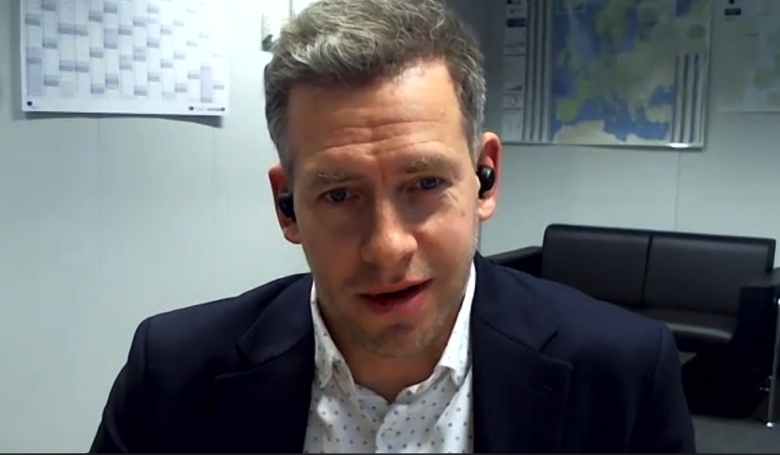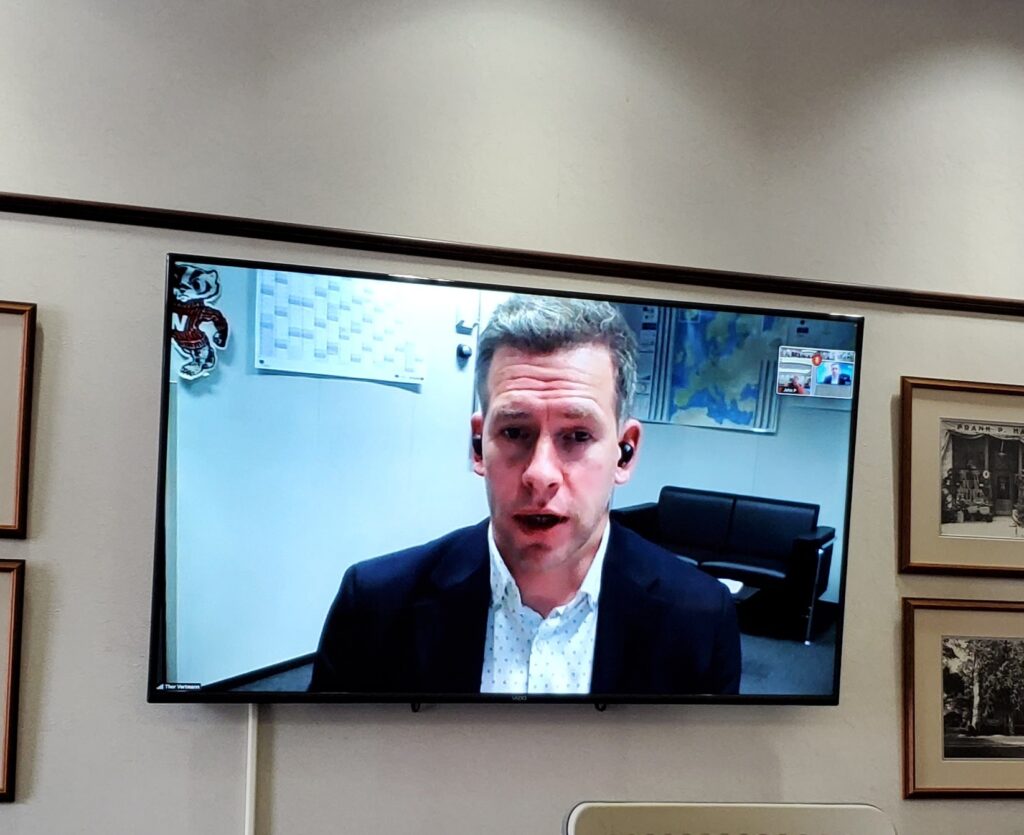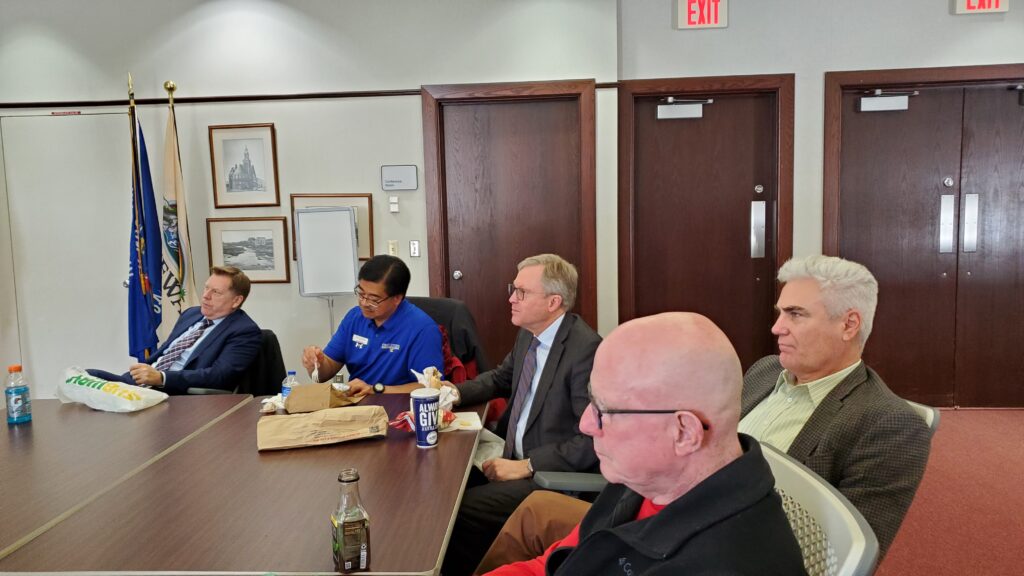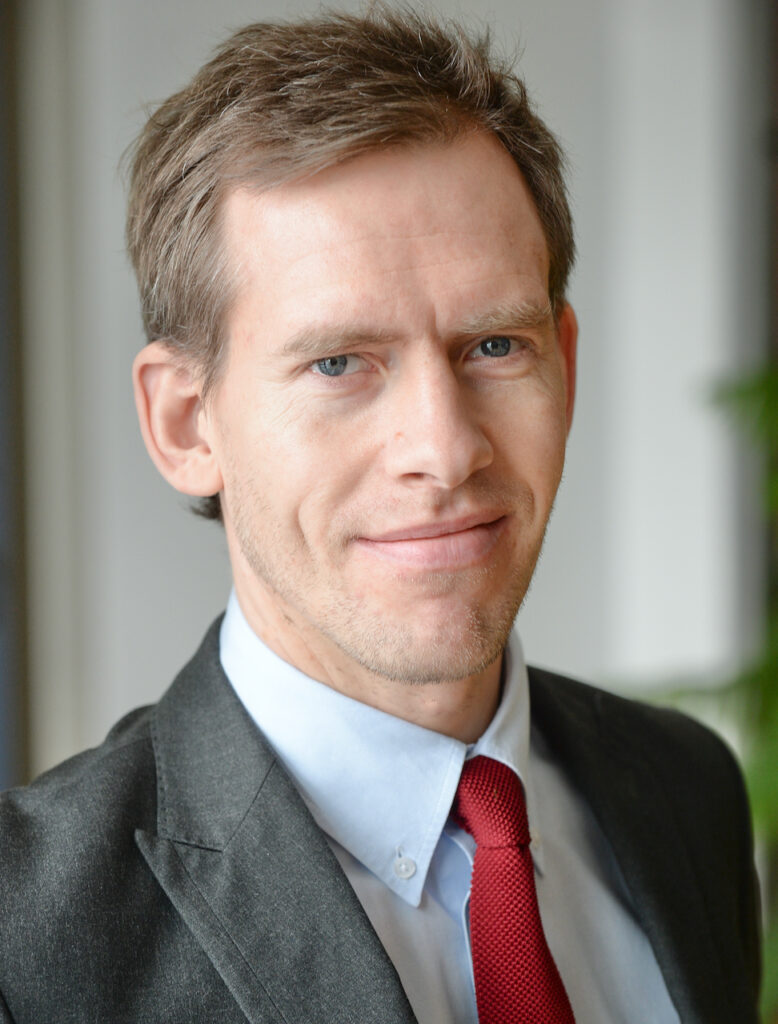By Chris Spangler
A former Whitewater High School foreign-exchange student has a front-row seat in the European Union’s efforts to show solidarity with Ukraine as it fends off Russian aggression.
Thor-Sten Vertmann, a 1995-96 Rotary Youth Exchange student from Estonia, is a member of the European Commission’s College of European Commissioners, which traveled to Kyiv recently to meet with Ukrainian government officials.
He spoke to the Whitewater Rotary Club via Zoom on Monday. Also joining the online gathering were Whitewater High School students and other interested exchange students and guests nationwide.
The 16-member European Commission’s College of Commissioners met with President Volodymyr Zelenskyy and his Ukrainian government on Feb. 2 to take stock of the EU’s support to Ukraine in different areas, including financial, humanitarian, energy, budget support and military assistance, as well as of the next steps of cooperation and reform efforts by Ukraine to advance on its EU path.
Vertmann’s own path to Kyiv traces back more than a quarter-century to when he was living with host family Ron and the late Kathy Binning and their son, Randy, in Whitewater. A daughter, Kari, was away in college.
Vertmann graduated from Whitewater High School in 1996 and went on to study political science and English language and literature in his hometown at the University of Tartu, Estonia. He also studied one semester at the University of Melbourne in Australia.
“I started my career as a civil servant in Tartu city government and held subsequent positions in several Estonian governmental bodies,” he told Fort Atkinson Online in an email. “Since 2015, I’ve worked in Brussels, Belgium, and have served two European commissioners — political appointments in European Union’s executive branch, the European Commission — from Estonia.”
He currently is on the team of Energy Commissioner Kadri Simson, covering the electricity market, nuclear energy and energy efficiency. Her position is the equivalent of the secretary of energy in the United States.
Energy assistance
Since the Feb. 24, 2022, Russian invasion, the European Union has provided around €50 billion (euros) to Ukraine, and the commission is working toward a €1 billion contribution toward fast recovery.
In addition to the up to €18 billion in macro-financial assistance for 2023, the EU announced during the Feb. 2 meeting another €450 million in assistance that includes 2,400 additional generators on top of the 3,000 already delivered; €157.5 million from the Energy Support Fund; and 35-million LED lightbulbs purchased by the EU to help Ukrainians reduce energy consumption.
It also created a strategic partnership to expand the ongoing energy cooperation between the EU and Ukraine to renewable gases such as biomethane, hydrogen and other synthetic and sustainably produced gases, and reaffirmed both sides’ commitment to reduce dependency on fossil fuel imports, especially Russian gas, and work toward climate neutrality.
“The EU has responded with sanctions for Russia’s actions, but more importantly for me, we have worked to cut the economic ties because Russia is a resource-rich country,” Vertmann explained Monday. “And just to go out of using Russian fossil fuels as quickly as possible is what we do. You need to do these things in kind of a tailored way.”
He noted that, when comparing the Gross Domestic Product or a country’s wealth, Estonia — a nation of 1.35 million residents with the minority being Russian-speaking — is the largest EU donor of military assistance to Ukraine.
“I would like to think the Baltic states, Estonia, Poland and other countries that have had experience with the Soviet Union are, in a way, the first responders, front-runners, when it comes to the Russian aggression,” he said. “We are trying to decode what is going on in the heads of the Russian leaders. Me, as an Estonian, a private individual, I am proud of what the EU has done in response to the war.”
A major impact, he said, has been cutting independence on Russian fossil fuels.
“It is very difficult to explain what is going on,” Vertmann said. “Work has been really tough for the past months since February last year.”
He said that no longer does he wake up in the morning and struggle for motivation.
“You have … the situation in Ukraine and the scale of human suffering there is just overwhelming, which is always now the context for the work,” the commissioner said. “I suppose all policy areas have implications in history, but the energy policy has been completely overturned by Russia’s behavior, by the war itself, and so this is the context. I am mostly doing things to try … to make Europe more resilient, independent from the Russian energy supplies, while providing direct assistance to the Ukrainians. That’s a big part of the work life now. This doesn’t end at 7 o’clock in the evening. You don’t really put that on hold.”
Typical work day
Vertmann, his wife and their son, 9, and daughter, 7, reside in The Netherlands. His wife works in The Hague for Europol, Europe’s equivalent to the international criminal police organization Interpol. Vertmann, who speaks Estonian, English, French and Russian, commutes 110 miles to Brussels, Belgium, about twice a week.
Responding to a question on his “typical day” at work, he said there is none.
“It depends on the list. Sometimes I need to think in the morning in what city I am. ‘Is it in The Hague in the Netherlands or is it in Brussels or am I on a work mission? And if it is the Hague or Brussels, where is my car? Did I come by car or did I take the train?’” He said.
The commissioner said that he does not like to “stretch things out” in the morning.
“I wake up and a half-hour later, I am at work. A quick coffee and I start doing things. I don’t like to chat in the morning. Let’s just get things rolling. It can be eight-, 10-, 12-hour workdays, especially when I am in Brussels and the family is in The Hague.”
He called Brussels “the capital of burnout and the European institutions.”
“My trick to managing the working hours and the stress at work is … I go as far away from EU quarters, because Brussels and Belgium are so much more than just the EU institutions. It’s small boring part of the town.”
He said that outside of the EU sector, Brussels is a beautiful city with two universities and many cultural, educational and culinary offerings.
“The working conditions are excellent in Brussels,” Vertmann said. “I have nothing to complain about. Just the work-life balance. My favorite part of the job is going home.
“I might sound too dramatic,” he added. “Of course, we have loads of fun and the mood is good and it’s good for motivation. I want to make that clear. But it’s not to say these are easy times at work.”
Favorite memories
Asked about memories of his year in Whitewater, Vertmann shared one that perhaps foreshadowed his interest in political science.
“My most vivid memory was in 1995. That was the last year of the Bosnia War,” he said. “This was the last occasion of active warfare on the European continent. And I remember — I believe this discussion took place in English class … — there was a discussion on … what is our (Americans’) role in these kind of things? Do we need to get engaged? Where is Bosnia? Where are the Balkans?”
He continued: “We discussed what was going on in Bosnia and people were saying, ‘you can’t ignore that. If you don’t get engaged, then who will? We have to do something. Just don’t be a jerk. In this situation, it is an easy choice. It is the decent thing.’ That’s made a mark on how I do see the Americans. Some small place in the Midwest, nobody knows Bosnia … and it’s so easy to look away, but you don’t do it. That was a big thing that I remember.”
He said he is witnessing that same concern today. While Eastern European countries have stepped forward to help Ukraine, so have nations around the globe.
“My point is that you don’t need to be next to the country to understand or have the basic empathy for the situation or for the event or the people,” Vertmann said.
Advice to young people
Rounding out the Zoom call, he was asked whether he had any career advice for young people.
“Political science: There have been times where I have been convinced it is really difficult for the younger generation to enter this area of studies because it’s been a popular field of studies,” Vertmann said. “Its really tricky to give advice, but my go-to claim has been ‘don’t pretend to be someone else. If that is what interests you, you want to spend time on it, go for it.’ … What is your skill set? What are your talents?
“I don’t think you can be good at everything, so just focus on your strengths. And if that’s political science, then join me.”


Two photos above: Former Whitewater High School foreign-exchange student Thor-Sten Vertmann addresses members of the Whitewater Rotary Club Monday via Zoom. Whitewater High School students and other nationwide guests participated during the club meeting remotely. At top is a screen shot view of Vertmann as he spoke with club members and guests. Above, Vertmann is seen on a big-screen TV where he is viewed by in-person meeting participants of the Whitewater Rotary Club. The meeting was held at the Irvin L. Young Memorial Library in Whitewater.

Members of the Whitewater Rotary Club assemble at the Irvin L. Young Memorial Library in Whitewater to engage with their guest Thor-Sten Vertmann, a 1995-96 Rotary Youth Exchange student from Estonia, who is a member of the European Commission’s College of European Commissioners, which traveled to Kyiv recently to meet with Ukrainian government officials. Vertmann participated in Monday’s Rotary Club meeting remotely. Contributed photo.

Thor-Sten Vertmann
This post has already been read 947 times!